‘Under the Bed’ Explores Life, Death, and Everything In-Between (The NoPro Review)
Candle House Collective’s festival of intimate one-on-one encounters stuns and surprises
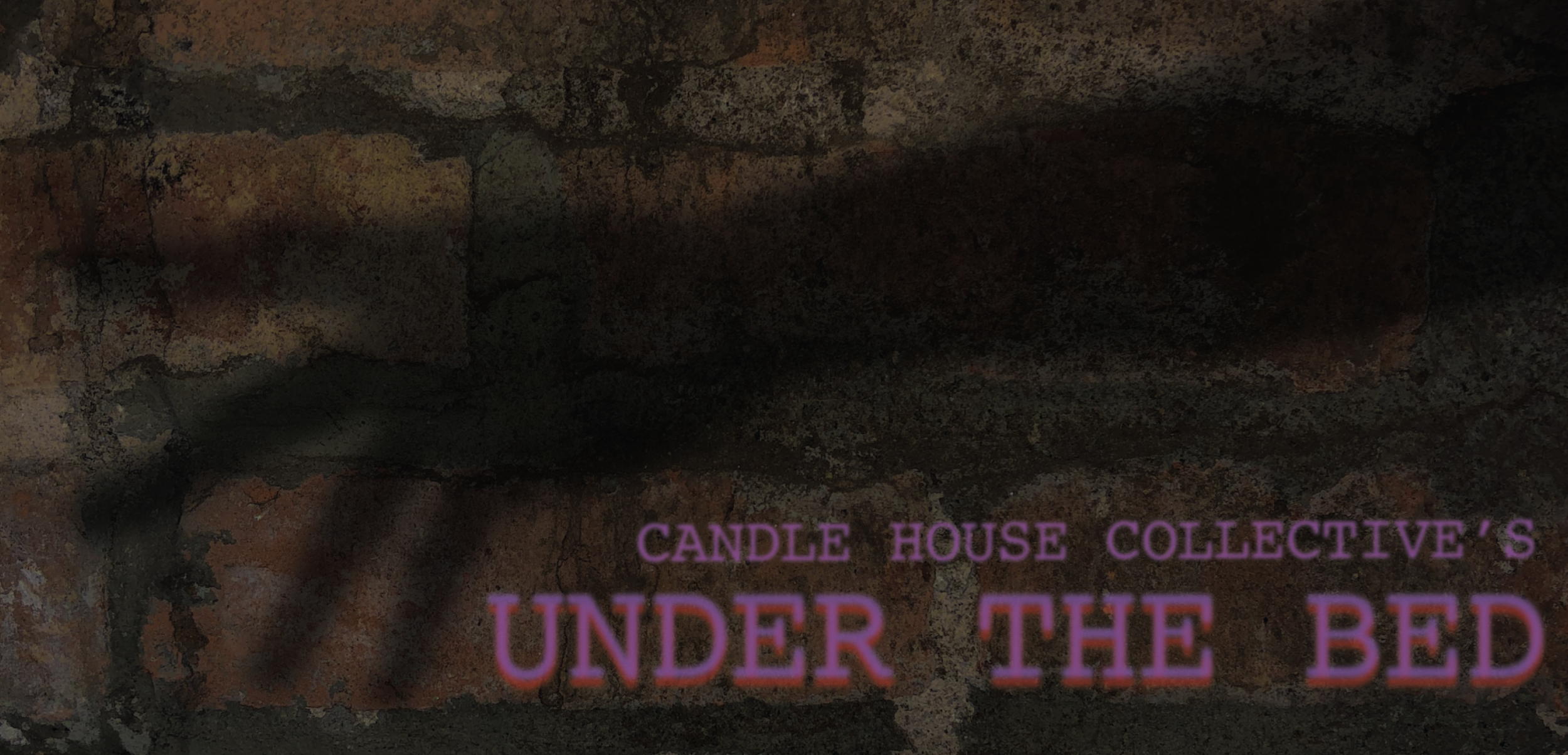

We sent our team of NoPro writers to experience Candle House Collective’s festival of interactive remote theatrical shows. Below are their reviews, containing light to moderate spoilers for each encounter.
Note: Some pieces contain extremely intense and disturbing content. Discretion is advised.
Over the past year and change, interactive theatre company Candle House Collective has carved out a very specific niche in the immersive space: “sentient radio dramas” that unfold remotely, through real-time phone calls and text messages with performers. Designed for an audience of one, these experiences invite participants to improvise along with the actors — making difficult decisions, giving advice, and even confiding in performers. It is an intimate and therapeutic format — one designed to place the participant and their worldview center-stage. And the result is often transformative, creating meaningful dialogue about societal structures, self-perception, and relationships.
Under the Bed, like previous installments, offers a vibrant collection of stories, containing a mix of the soulful, the macabre, and the political. But it also tries something new: a select-your-own-experience menu, allowing audience members to choose from an assortment of remote “connections.” Newcomers can try just one show at an affordable price; fans may want to purchase them all. And those who wish to avoid topics like sexual assault or body horror can write to Candle House and receive personalized recommendations that consider their triggers.
There is one significant drawback to this arrangement: only participants who purchase four or more connections will receive a call from the Operator, the enigmatic “host” of previous shows. The Operator’s helpful framing at the top of the experience was a highlight of past Candle House seasons. On a narrative level, it was incredibly satisfying when he contextualized discrete stories, identifying their thematic connection and making them feel part of a single unified experience. And as a participant since Candle House’s inception, I have been touched to find that the Operator remembers my past experiences, gently alluding to previous conversations and remarking on my journey thus far. I was saddened to only connect with him in the addendum call that closed out my Under the Bed experience, and I hope more future participants have the opportunity to connect with my favorite storyteller.
Aside from these changes in format, Under the Bed represents Candle House in their signature form: using wistful and tormented characters to explore the nature of humanity.
I am no Operator, but if I were to explore the thematic thread that wove all the stories together, it would be this: ‘Under the Bed’ explores the wide and tragic gulf between who we believe people to be and who they really are.
— Lauren Bello
BLACK BOX

Every student of theatre knows about “Chekov’s gun.”
It’s the idea that if you show a gun in the first act, the audience knows it’s going to go off by the time the final curtain falls. In fact, if it doesn’t, the audience is bound to be disappointed.
There’s a similar dynamic at play with the content advisory system colloquially known as trigger warnings. They exist in order to give folks who might be subject to a strong psychological reaction a chance to either opt out or mentally prepare for confronting potentially damaging material.
Put it this way: if you’ve recently dealt with the loss of a pet, maybe you don’t want to watch Old Yeller. Or more to the point: if you’re the survivor of an assault or abuse of some kind, you deserve a head’s up that you are about to encounter material pertaining to that kind of experience.
(With that said: what follows includes a discussion of sexual assault and suicide, but will not involve details, as those are not pertinent to the matter at hand.)
Of course, if you know that something is coming, you can’t help but wonder when it is going to get there. What exactly it might be. This thought was at the back of my mind through the first half of Black Box, whose set-up had a decidedly Twilight Zone vibe.
Told by intercutting the titular black box recordings of a doomed airplane with segments where the pilot or co-pilot talk to you over the phone, the piece is a taut psychodrama between the two men. What starts as a mentor/mentee relationship twists itself into something more sinister over the course of the hour of the play. Phrases that seemed innocuous at the start become laden with dark meaning by the end.
At first both the alias you’re assigned within the fiction — a distant air traffic control officer — and the role you are given in the mechanics of the drama — semi-passive observer — are incidental. The hook soft enough that my more impish side came out and I adopted a voice and an alias, playing a bit with one of the actors to see just how much the piece would adapt. The answer: not much.
Because that wasn’t the point.
And indeed the thought was there in the back of my mind: when does the twist come in? When does it get dark?
When the darkness finally comes — and it does as we cut away just as a line of harassment takes a turn for the worse — our role becomes illuminated. We’re here as a kind of confessor, jury, and judge. Helping the victim of the assault come to terms with the action that he took in response. One that doomed himself, his attacker, and scores of innocents.
Or maybe our presence helped avoid that fate. I left a bit unclear.
All in all Black Box was a slow burn, driven by laser sharp writing and performances, but perhaps enabled a bit too much by the foreknowledge provided by the trigger warning — a paradoxically comforting assurance that all was not as it first appeared to be.
While it may have felt a bit more like listening to the best damn radio play I’ve heard in some time than like a full fledged immersive/interactive experience, it still has the whole “best damn radio play” thing going for it.
— Noah Nelson
GOOD MORNING
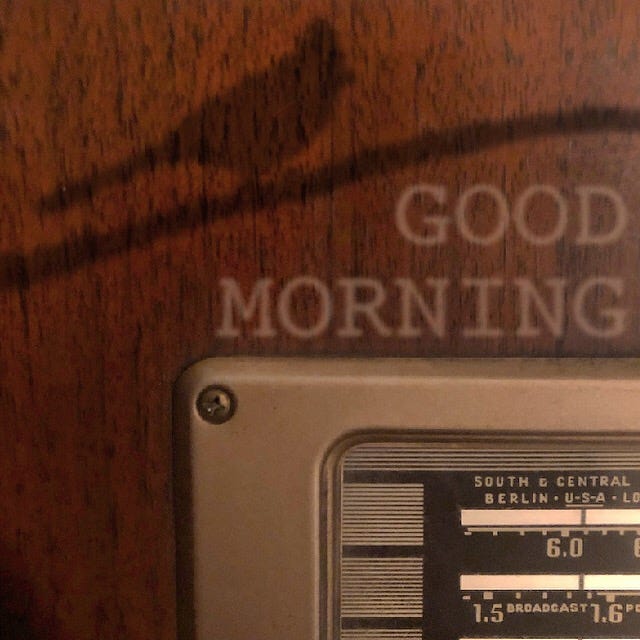
A warm cup of hot chocolate in my hands, I make my way back to bed, and make myself comfortable.
“Good morning, Jubilee!”
The quiet radio host welcomes his listeners to this morning’s broadcast. The soft spoken, gentle mannered Mr. Charles Alwick (performed by Jack Drummond) is, as always, the master of ceremonies on this brisk snowy day in the town of Jubilee, Ohio. It’s a small town, with a small town radio station, and, for today, I have been selected as the lucky caller into the program.
Throughout the program, as always, Charles chooses to feature a profile of one of the residents of Jubilee. The radio program feels like a call-back to a bygone era of media, a quieter, more genteel time. We start with Ms. Harriet Fischer, owner of the Jubilee Curios, the town’s antique store, who was a key advocate for bringing back the Cardinal Festival. This festival, a celebration of the day that the Cardinal birds, with their bright red feathers, return to the town, once was an annual tradition, but one that had faded over time up until a few years ago.
As always, we learn more about the history of Jubilee, this quintessential American town, as the radio program progresses. Slowly, but surely, I begin to realize that not all is as it seems in this small town. Dr. Ruskin, the single practicing physician in Jubilee, happened to be the first to welcome the “newcomers” into the town. The community was trusting at first, but the peace that the townsfolk had known seemed to be at risk. These newcomers, initially friendly, seemed to want a place within the town life. Soon, their increasingly odd behavior had the townspeople skeptical and wary of the “medical experiments” that they had begun undertaking underneath the small church in the center of town.
These immigrants, did they know what it meant to be a resident of Jubilee? Would they be willing to follow the customs? Would they celebrate the Cardinal festival?
Our narrator becomes increasingly flustered through the broadcast and the trust that I had placed in this quiet, well-mannered man begins to wane. I begin to suspect that not all that is being shared with me is entirely true, or, at the very least, has been colored somewhat by the man broadcasting to the world. His comments come quick and fast and a snide remark here and there about the “newcomers” quickly disintegrates the faith that I have in this man. His occasional outbursts seem totally out of character, but then I suppose, how much do I actually know about this man who has me on the phone?
Charles addresses me personally, ignoring the rest of the listeners. He asks me, whether I would understand. Whether I would have done what they had done. Whether I agree with the stance that the town took. Through a series of increasingly specific questions, I am asked to take a moral stand on each point. I am brought into these decisions, I am made culpable, an ally of the townspeople, and of their actions. The community made choices, choices that seemed fair and sensible at first, some that even I would agree with, but as each one is brought to my attention, their moral high ground becomes more and more like sinking sand.
Further revelations come, as the actions of the “newcomers” is brought to light, but the trust that I had in our narrator has long flown away by this point. As the broadcast comes to its close, we have the final citizen profile, which is of one Mr. Charles Alwick, resident of Jubilee, the former radio host of Good Morning Jubilee. The radio station, along with the town itself, it turns out, burnt down some time ago. A vicious fire overwhelmed it. Charles knows that it is not morning where I am. He knows that the radio station is no more. He knows that this may be the last time he speaks to me… and the line goes dead.
I sit, and am left to ponder what I had just experienced. My mind whirs with unanswered questions: with the mystery of what truly happened; with the quiet, yet oddly threatening, narrator; with the sci-fi mystery; and with the bygone era vibes of the piece. I feel like I have just experienced a real life episode of The Twilight Zone, complete with its signature twist at the end. And as with every good episode, there is a moral or a lesson to unpick from the entertaining, yet chilling, mystery.
I am left to contemplate the very nature of community, change, and most importantly, of trust. All this, from a simple hour-long phone call.
The performance by Drummond in Good Morning is truly stellar, keeping me enraptured throughout the whole experience. With only the occasional moment of brief respite when a 60’s song might play, he is truly “on air” for the entire broadcast. Switching off from the rest of the world, getting rid of the distractions of the day, and simply sitting and listening in itself was a refreshing call back to the “Golden Age” of radio. How wonderful to find great immersive work that doesn’t rely on grand spectacle, but rather on a sense of quiet intimacy. Good Morning, alongside all of the other experiences from Candle House Collective’s Under the Bed festival, is so easily accessible — all that is required is a cell phone and a willingness to stop and just listen. It is one of the most moving, and thought-provoking one-on-one experiences I have ever had in an immersive show, albeit it one taking place in my own home.
As an immigrant myself, this was a haunting experience. It still amazes me to hear people’s unabashed thoughts on the “immigration problem,” forgetting that I too am one of “those” people. Xenophobia is an unwelcome reality in today’s world and this piece was an apt representation of how this behavior can manifest itself. The once strong, thriving community, had become undone. Was it the fault of those who had come to join Jubilee, with their increasingly bizarre behavior, or does the fault lie with those already there, those unwilling to welcome the newcomers into their midst? And who do I side with?
I look down at the singular instruction that I was given, prior to this experience. The hot chocolate in my hands has grown cold now, the milk beginning to form a seal over the liquid beneath it. Slowly, the substance has changed over time, into something quite different. If it had happened all at once, I would have known, I would have spotted the moment it happened. Perhaps if it had happened quickly, I could have done something to change it, something to improve the quality of the substance, maybe I could have made a difference. But, that is not how these things happen, is it?
This drink, this unused prop may well be the best representation of the story that it belonged to. As I pour the now cold chocolate down the sink, I think of Charles, of Jubilee, and of the countless other stories that this one disastrous example represents. So many untold stories. I contemplate the “lesson” as my thoughts follow the liquid as it swirls slowly, methodically down the drain.
What had at first been a source of comfort and warmth, it had gradually grown cold, now unfit for consumption.
Goodbye, Jubilee, and thank you for what you have shown me.
— Edward Mylchreest
REBOZO
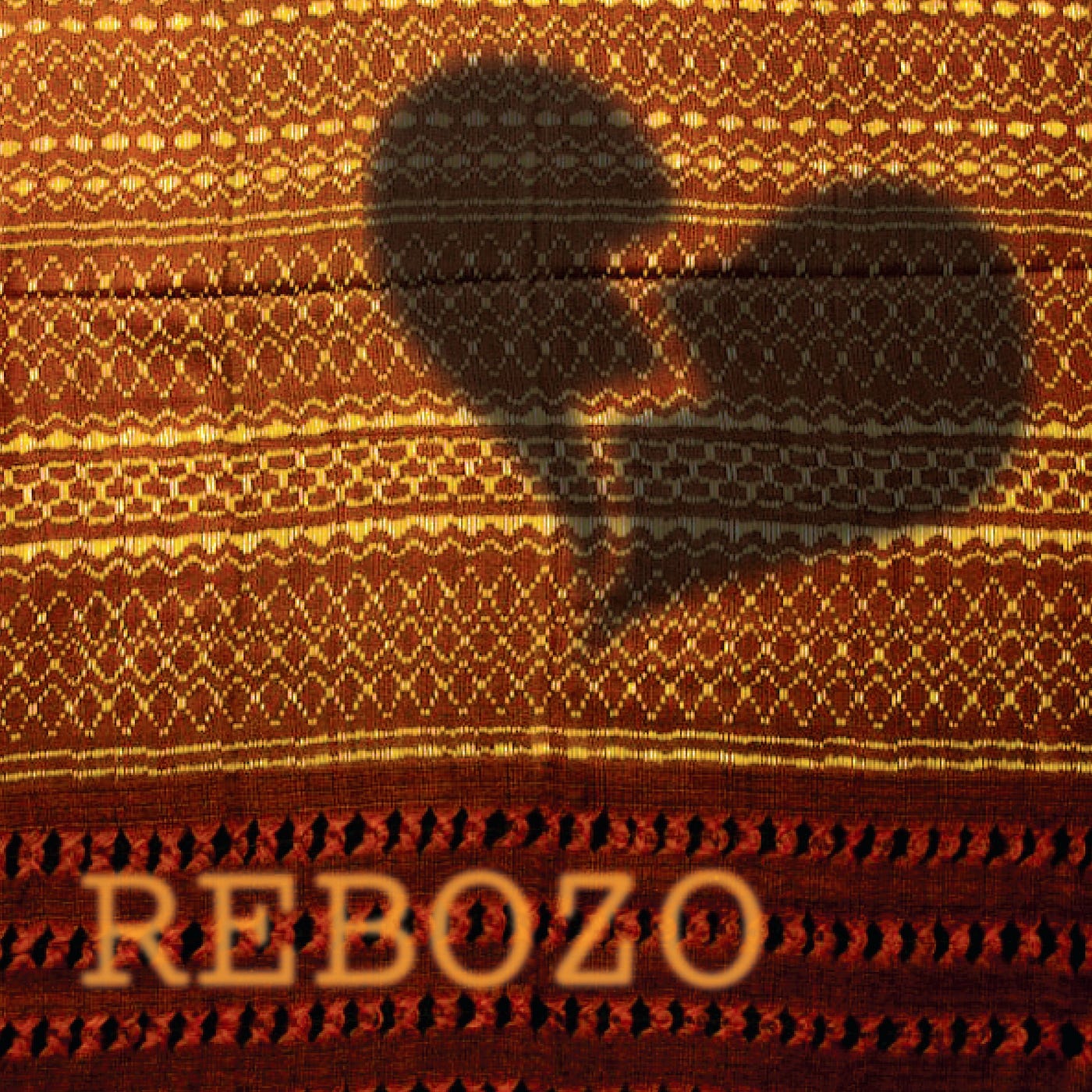
My two-day stint in couples counseling begins with an audio training guide.
Cheerful and breezy, the recording informs me that I have volunteered to be a Connector for Rebozo Connections — a free, phone-based emotional health service. As such, I have been randomly assigned to a couple seeking help in raising their young daughter, Rachel. The process is simple: first, I’ll talk to the couple separately, taking notes on their different perspectives. Then, in a third call, I’ll counsel them together.
Get No Proscenium’s stories in your inbox
Join Medium for free to get updates from this writer.
SubscribeSubscribe
“You may note that this training guide is quite brief and non-specific. If you find yourself worrying about this… don’t!” advises the audio guide. No special training is needed: all I need to do to help this couple is to “be the best of me.” And to remember, the recording adds in Spanish…there are two sides to every story.
With that in mind, I settle in to my first call: Cooper (Harrison O’Callaghan), the astrology-loving vegan dad, who’s frustrated with his fiancé’s stern approach to discipline. Not only is his fiancé strict and authoritarian, but she’s strangely fixated with scary bedtime stories — insisting on telling their daughter Rachel the frightening folktale “La Llarona” every single night. Now, their daughter Rachel has completely stopped speaking, and has taken to drawing dark and alarming pictures. He’s convinced that his fiance’s behavior is to blame. But my second call, with his partner, paints a different story: Luisa (Sar Cohen), the Catholic mom from a wealthy family, finds Cooper to be sensitive, intense, and changeable; Luisa is the consistent one. She claims she’s adapted her bedtime story — created her own spin on “La Llarona” — so that she can appropriately warn Rachel about how the world treats women. Compounding matters, both Cooper and Luisa recount fighting over everything from finances to their relationship with Luisa’s parents. Who’s in the right? What does compromise look like, and what scenario is best for Rachel?
In the session that follows, where I speak to them both, I do my best to facilitate communication. Sometimes I even seem to make progress. But there is a guardedness in their answers, a thread of tension running through even their apparent reconciliation. I’m not getting the full story, from either of them.
So I wait for the other shoe to drop.
The next day, it does.
In a panicked cascade of phone calls, I learn that Luisa is fleeing with Rachel, intending to allow her parents to raise Rachel as their own; that Cooper’s response to her attempt to leave is to erupt in rage; that there is a tragic reason why Luisa was desperately bent on equipping little Rachel to defend herself. As the tale of La Llarona and the tale of Cooper and Luisa and Rachel intersect, I find myself whispering to a little girl who does not speak, urging her in careful coded language to break free.
The story resolves in typical Candle House fashion: ambiguously, artfully, and bittersweetly.
A longtime fan of Candle House Collective, I purchased all six Under the Bed experiences. I think it is safe to say that of the six, Rebozo stands out as the most richly layered. Informed by perspectives on sexism, domestic violence, religion, and enmeshment, and reflecting back on itself in its musings on storytelling-as-cautionary-tale, Rebozo provided enough fodder for thought that I re-read my notes on the experience for weeks. Had male participants experienced the tale differently than I did? Had others reacted as strongly as I did to Rachel’s isolation? Had anyone else found themselves disclosing stories of their own childhood to both Luisa and Cooper? And most of all — to what degree had I been complicit in the events that unfolded?
Rebozo also featured some of the most stunning acting of the collection. The performers were telling two stories — the surface story of reconciliation, and the undercurrent story of trauma. On one level, they effectively sold the idea that they were softening, that I was getting through to them, that they might be willing to reconcile. When they were together, they even started to communicate more kindly, shifting from stiff disagreement to warm sympathy, sounding like they were genuinely enjoying each other. Yet when I pressed on forbidden topics — like asking Luisa who she was trying to protect Rachel from — she would stiffen. Retreat back into herself. Meanwhile, Cooper presented differently in different situations — his vocal pitch changing slightly when Luisa was listening, growing sharp when he didn’t realize I could hear him. Both actors maintained a valiant act at tentative togetherness…and revealed a hidden intensity when the veneer of politeness was punctured.
In my addendum call with the Operator, I was offered a chance to hear any one character’s “outgoing message” — an epilogue to their story. Without hesitation, I chose Rachel.
It would be a shame to attempt to relay her outgoing message with you: there was something that felt deeply private in the sharing of it. I will say that as unsettled and disturbed as I was by the tale, the epilogue did little to assuage my fears. It offered no easy answers…and I wouldn’t have it any other way.
Sometimes it’s best to be haunted.
— Lauren Bello
NEXT TIME
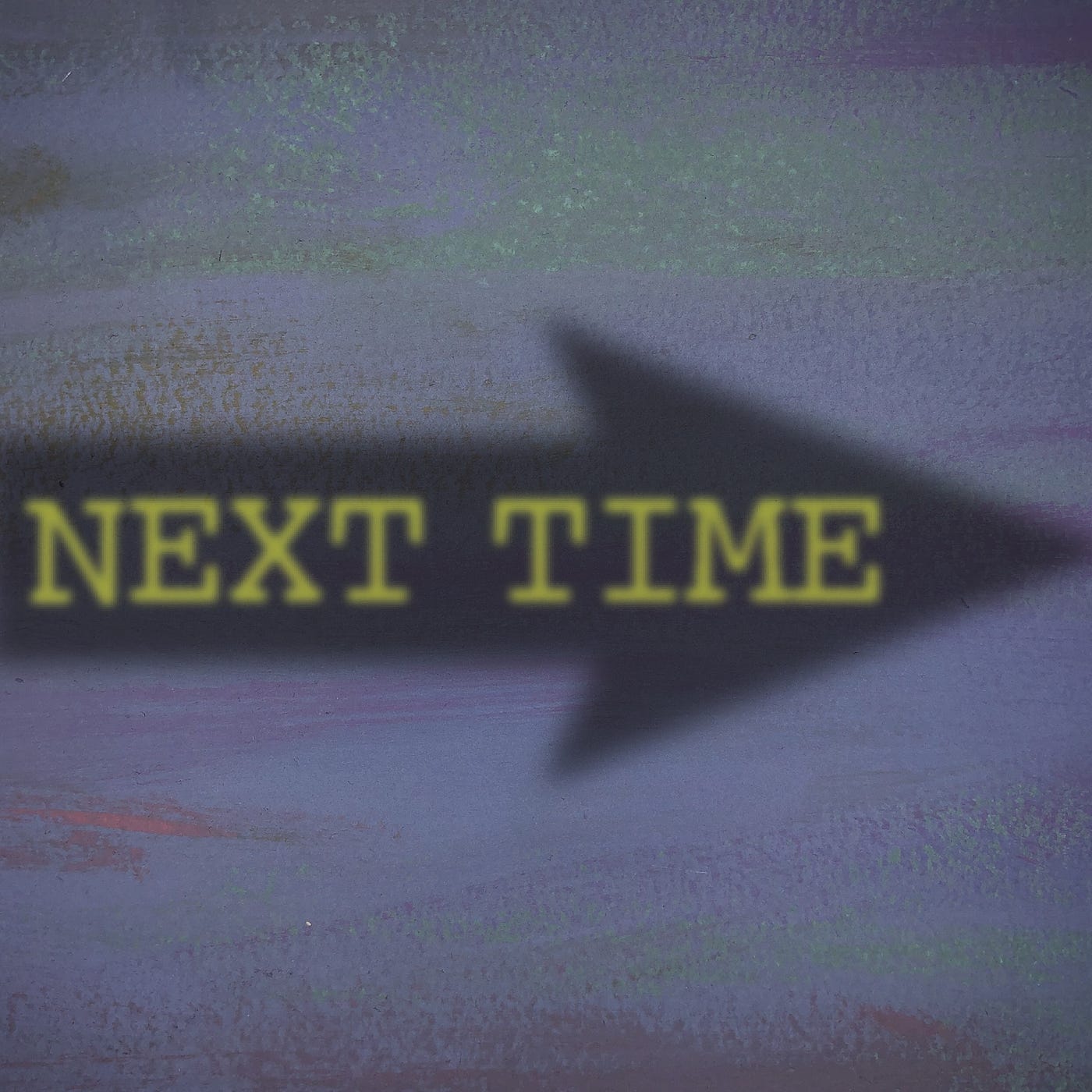
I’m dead.
I knew it would happen one day but I didn’t know I would find out like this. And by “like this” I mean by receiving a phone call from my caseworker at the office of death and spiritual what-have-you. (At least I get to go through the bureaucratic paper-pushing of being dead from the comfort of my own bed!)
Right away, my caseworker (Katy Murphy), a whirlwind of chaotic energy and probably just a bit too much Red Bull, asks me to name her, preferably after something that I anticipate greatly. I name her “Pancake.” She loves it. But now she gets to name me, because, of course, I’m no longer “Allie” and it will help us “bond.”
“Alright, Bacon, now that we’ve got that out the way, let’s get on with the survey!”
It’s Pancake’s first day at the office, but she’s made sure to let me know that we have to finish the survey in 60 minutes or less, otherwise I’ll be put on hold for 700 years and will be forced to listen to “Mambo No. Five” for the entirety of it. She asks me questions about Allie’s life: Did Allie like her body? Did she accomplish something she is proud of? Did she have any regrets? You know, typical afterlife stuff, but all to help me determine whether I’d like to “Move On” or proceed to “Next Time.” Allie was the form I had Last Time, and I had 201 Last Time’s before that (I’m proud to say that I was once the pig that inspired Charlotte’s Web, amongst many other forms of life). I can either choose to Move On into whatever the afterlife might hold as Allie, or try my luck with another Next Time.
Candle House Collective has succeeded in creating one of the most intimate and thought-provoking moments I have ever experienced, and the kicker is that it all happens over the phone.
Of course, the nature of the content in Next Time lends a huge hand in this area, as talking about death and lifelong regrets right off the bat forces the boundaries of social niceties to the background and creates a world of its own. It’s a world very close to ours, but a bit different, and that’s made clear from the start. As soon as I discovered what the “rules” of this world were, I was able to put my hesitations to the side and participate in the experience honestly and fully. The fact that it’s a phone conversation also provides a layer of anonymity that is crucial to the success of this encounter. I didn’t feel judged or like I needed to seek approval of my interaction from the performer (which I often feel during in-person encounters), so it was easy to trust Pancake with my honest answers to all the questions. For me, specifically, being able to give that level of honesty led to a beautifully poignant and terribly fleeting conclusion of the event.
As we are rapidly moving through some more questions, Pancake suddenly stops with a sharp breath. She asks me to open my door. “Can you step outside?” Yes, of course I can. Pancake then tells me in a panic that I am not dead but am in fact still alive. I believe that to be fantastic news, but Pancake is absolutely losing it. She takes a breath and informs me that you only get 60 minutes per lifetime to complete the survey, and we had already spent 34 of mine, as in, I have to complete the survey now or be put on hold and forced to listen to Lou Bega for 700 years. I now understand her panic. I agree to complete the survey now and we speed through the rest of the questions, then it finally comes. I need to decide: would I like to have another Next Time or will I Move On?
Here’s where the true craft of Next Time comes in. If anyone had asked me before now if I’d like to be reincarnated into another living being, I absolutely would have said “yes,” no doubt about it. I even felt the same at this moment in the process. But what came next changed things for me entirely.
Pancake lets me know that she’s there to answer any questions I might have that could help me make my decision. We calculate my remaining Next Times, 149. The chances of landing another human life form are unpredictable but based on 1/201, they seem slim.
I guess I never really thought about the rules of “the next life.” I just kind of assumed it was eternal and I entrusted it to the universe to always end right. Now, when faced with the facts, I am forced to make an important, life (and death) altering decision… before I’m even dead yet. The stakes are incredibly high and I feel a bit boxed into a corner, which is an integral part of the success of this piece. The circumstances are designed so meticulously to lead the participant into this transcendent moment, where the pressure is on and the anxiety is real. I found myself forgetting to breathe for a brief moment. I ask her what Moving On is like, will my people be there? “Yes,” she says, “whoever you have now will be in your Moving On if you’d like them to be.” I make my decision; I choose to Move On.
“It’s crazy brave to want to be yourself forever, but Allie seems like someone really worth being happy with.” Pancake says. I feel a bit sad, like maybe I missed out on an opportunity, or was a part of something that was over too soon. But mostly I feel peace. At least now I know what happens when you die.
Well, kind of.
— Allie Marotta
LUCKY ONES
Content warning: mass shootings
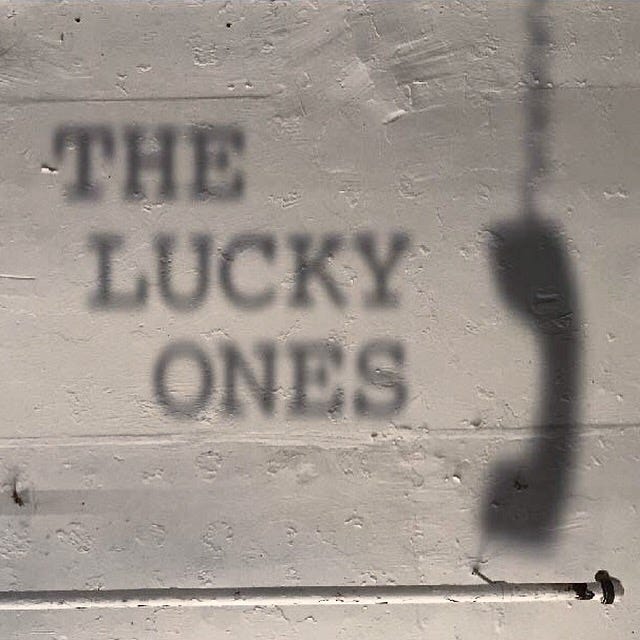
We aren’t strangers to disempowerment. I, and so many others, have lived through 9/11, the Patriot Act, the Virginia Tech Shooting, the Sandy Hook Elementary Shooting, our current president locking children in cages… I could keep going, but you get the point. Things we used to take for granted, from ideals like privacy to the simple “not dying when we go out in public” have now become open questions. The reaction, one that we’re all guilty of, is apathy. We’d all like to believe we’d fight injustice at the social level, but there is too much in our days and too much wrong in the world for the vast majority of us to muster the strength to fight. It makes sense — in a constant barrage of bad news, we defend ourselves via pessimism, convince ourselves that things inexorably get worse, and things do, in fact, get worse.
Take, for example, the seemingly straightforward example of a mass shooting. Why do we call a “shooting” anything else? Raise the question and you usually hear the excuse that it’s out of sympathy for those affected. After all, the truth is too harsh. But in actuality, the truth seems much sadder. We convince ourselves that these attacks, these shootings, are natural tragedies, unavoidable incidents, as opposed to the result of human-devised systems that allow them to exist. We even cloak them in the words I use above: “tragedy” or “incident,” as opposed to calling them what they are. A shooting is a shooting. “Tragedy” gives a passive voice to it, a sense that it wasn’t caused by a series of decisions.
Anger is powerful, though. Sometimes, when someone is personally affected, their grief turns to anger, to fight the systems that are then obvious to them. The Lucky Ones is a beautiful, horrifying engine for creating that grief and anger. Starting as the story of a joyful woman escaping her life as a corporate drone for a farcical corporation, it evolves into a visceral story about the senselessness of America’s gun addiction and the lengths even well-meaning people go to in order to preserve the status quo.
The opening, light-hearted segment of chit-chatting with Blake (Taylor Feld) from the Kuso Healing Company was a wonderful opportunity to create empathy quickly. When you have an inside joke, it’s hard not to care about a person’s fate. For us, it was our names. To avoid confusion, and for a giggle, we quickly began referring to each other as Alpha Blake (her) and Omega Blake (me). We talked about her dreams, her irritating coworkers, the worthlessness of the products she was shilling. It was her last day on the job, so why not chat with a friendly stranger somewhere else? By tomorrow, Alpha Blake would be in San Francisco, achieving her dreams of becoming a musician. For the moment though, it was me and her, defending the honor of Dolly Parton, comparing our mutual morbid fascination with Gwenyth Paltrow and Goop, and chastising her cubicle neighbor for sticking her nose into our call.
Then came the shooting. Not the “incident,” not the “tragedy,” but the shooting. One minute Alpha Blake was going to play me a song; the next, she’s the last woman standing, running for safety, and I’m her lifeline.
It’s funny how focused people can become when faced with danger or adversity. I could feel my anger and fear somewhere in the back of my head. On the line, though, as the shooter rampaged through the office, Alpha Blake cowered in a closet and begged me to keep her calm with a story of something happy while her coworker was sprawled on a desk and missing half her face. Even as all of this unfolded, all I could think of were the procedures needed to help keep her alive, if at all possible. Grief could wait.
Hiding in that closet, she survived the shooting and called me a second time. But, of course, things got worse.
Enter Alpha Blake’s social worker, Lena (Cassidy Sledge). We’re in America, and without insurance Alpha Blake can’t see the real therapist she needs. Social work has its place, but immediate care of severe trauma and grief is not it. Alpha Blake, wracked with survivor’s guilt, sacrificing her dreams, barely able to move. She was nauseous, feeling ashamed after stealing drugs to try to numb the pain. And she was angry, as am I, as we all should be.
Lena asked her to move on, to ignore it, to just be thankful that she’s one of the titular “Lucky Ones.” Perhaps it’s fortunate that she survived, but “luck” is the worst description to apply to this situation, and Alpha Blake knew it. Luck had nothing to do with this. This shooting (not “incident,” not “tragedy,” as I keep having to remind the social worker, trying to keep from shouting at her) was the result of countless decisions, made by an angry man with a gun, a congress full of greedy men with a constituency, and an apathetic public who still didn’t say “enough” after preschool children were executed.
I can’t support Alpha Blake’s nihilism, but I can’t blame her for it either.
The blind “ever forward” exultations of her social worker, on the other hand, filled me with rage. It was a funny feeling; I was brought in to comfort Alpha Blake, encourage her to leave the past in the past, and I was the one who snapped. There I was, telling her to hold on to her grief and turn it into something useful.
What strikes me about the range of emotions I felt during Lucky Ones was how unexpected they were. (I should note Candle House Collective has some of the best safety protocols in the business, as appropriate for this intense of a production.) I thought The Lucky Ones would be a horror story presented against the backdrop of a telemarketing call. I wasn’t wrong. It was just a much realer horror story than I was expecting. Candle House creates a window between your life and another world, and brazenly refuses to highlight any boundary between the two.
Having not previously done any remote immersive theatre, I almost feel like I skipped a step. I would have happily given a positive review to a personalized spookhouse delivered over the phone. That struck me as the logical first step for a new facet of the immersive landscape, similar to the simple VR arcade games that marked the first experiments with the form. But through my first experience with tele-immersive (along with Good Morning, which I also loved) we’re already well beyond that. Lucky Ones is a nuanced, sticky story that will haunt me every time I see someone simply accept an intolerable status quo.
Candle House gives you an option to talk to someone out of universe, in case you need any support after the shows, which almost all reach this level of drama and force their audience into agonizing decisions. I simply told them to extend the show and offer comps to congress. I hope they’re angry enough to do so, and will keep shouting, keep pushing against the complacency that allows the decisions, from start to finish, that lead to, no, permit shootings to keep happening.
I know I am. Consider this review my first yell.
—Blake Weil
Candle House Collective’s Under the Bed festival has concluded.
NoPro is a labor of love made possible by our generous Patreon backers. Join them today!
In addition to the No Proscenium web site, our podcast, and our newsletters, you can find NoPro on Twitter, Facebook, YouTube, Instagram, in the Facebook community Everything Immersive, and on our Slack forum.
Office facilities provided by Thymele Arts, in Los Angeles, CA.